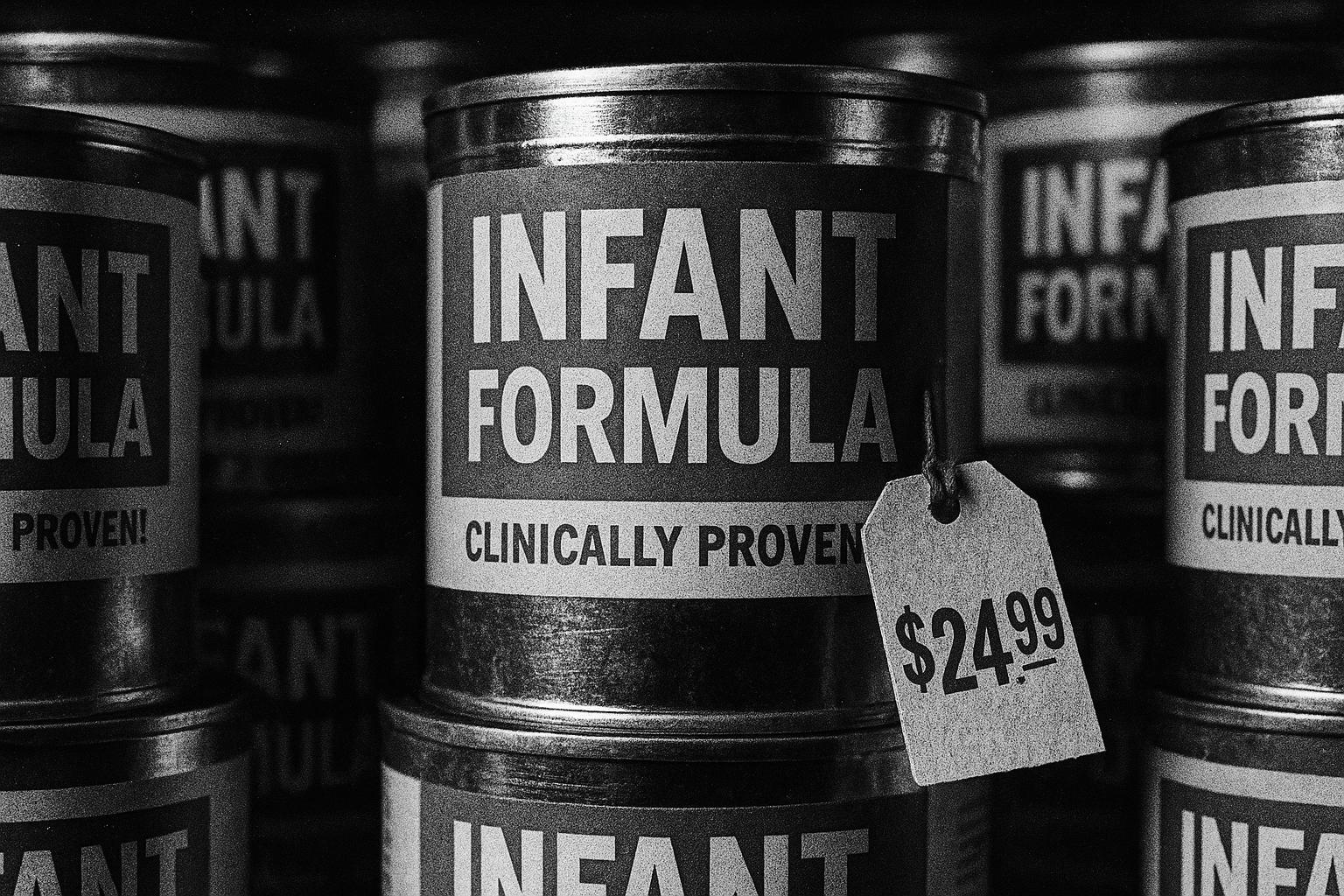A major CMA market study found average infant‑formula prices jumped more than 25% between 2021 and 2023 and says branding, labelling and NHS supply practices can mislead parents. Liberal Democrat MP Jess Brown‑Fuller has urged ministers to act on remedies ranging from standardised labelling to curbs on brand presence in clinical settings to protect breastfeeding and improve value.
An Evening Standard report has renewed pressure on ministers to act after Liberal Democrat MP Jess Brown‑Fuller urged the Government to tackle what she called “exploitative” marketing in the infant formula sector. The story draws on fresh scrutiny by the Competition and Markets Authority, which industry and consumer groups say has exposed how branding and labelling practices can mislead new parents at a time when they are most vulnerable.
The Competition and Markets Authority’s final market study, published in February 2025, found historically high prices, weak rivalry between brands and limited own‑label alternatives. The 185‑page report documents that average prices in the sector rose by more than 25% between March 2021 and April 2023 and sets out a package of remedies designed to improve choice and value. According to the CMA, potential solutions include standardising labelling, reducing brand influence in healthcare settings and strengthening advertising restrictions to prevent misleading claims.
The CMA and consumer campaigners detailed a range of marketing tactics they say distort parents’ choices. These include near‑identical branding across infant and follow‑on formulas that can encourage brand loyalty, discounted or supplied products in clinical settings that create the impression of NHS endorsement, and bold on‑pack statements implying nutritional superiority despite rules on composition. The regulator concluded such practices, combined with a paucity of lower‑cost own‑label options, have contributed to weak price competition.
Global health authorities say there is a wider public‑health context to the debate. The World Health Organization states that breastmilk is the optimal nutrition for most infants and warns that inappropriate marketing of breast‑milk substitutes undermines breastfeeding. WHO supports the International Code of Marketing of Breast‑milk Substitutes and urges countries to enforce measures that protect and promote breastfeeding — a point highlighted by breastfeeding advocates in response to the CMA’s findings.
National monitoring also points to shortcomings. The World Breastfeeding Trends Initiative’s UK assessment for 2024 scored the country 48 out of 100, noting progress in some areas but major gaps in policy, maternity protection and enforcement of marketing rules. Campaigners say that score underlines the need both for stronger regulation of commercial promotion and for better public‑health support services for parents.
The CMA’s earlier interim summary, published on GOV.UK in November 2024, underlined why price promotions are rare: current advertising restrictions intended to protect breastfeeding can have the unintended consequence of limiting how firms compete on price, the regulator said. Consumer research cited by the CMA found parents often choose brands in “vulnerable moments” and may mistakenly equate a higher price with superior nutrition, despite guidance that all widely available formulas meet required safety and compositional standards.
Practical reassurance for parents comes from health charities and clinical guidance. The National Childbirth Trust advises there is no single “best” formula for a healthy, full‑term baby and stresses that most commercially available formulas meet the same nutritional and safety standards; it recommends parents seek evidence‑based resources and professional advice if they have concerns. The CMA says improving information and choice is a central plank of its proposed remedies so that parents can make better informed decisions without relying on price or branding cues.
Ministers have said they will consider the CMA’s recommendations as part of their response. The regulator has invited further consultation on specific measures before any legislative or regulatory changes are made. If implemented, the proposals could reshape how infant formulas are presented to the public and used within NHS settings; opponents and industry bodies are likely to argue over the balance between restricting commercial promotion and preserving innovation and supply.
For now, the CMA’s report, international public‑health guidance and national monitoring together present a case for change: clearer, standardised labelling, limits on the role of branding in clinical environments, and strengthened enforcement of marketing rules — alongside better support for breastfeeding — are the remedies being advanced to protect parents and improve value in a market that has shown sustained price rises.
 Reference Map:
Reference Map:
Reference Map:
- Paragraph 1 – [1], [2]
- Paragraph 2 – [3]
- Paragraph 3 – [2], [3]
- Paragraph 4 – [5]
- Paragraph 5 – [6]
- Paragraph 6 – [4], [3]
- Paragraph 7 – [7], [3]
- Paragraph 8 – [3], [4], [6]
Source: Noah Wire Services
- https://www.standard.co.uk/business/business-news/government-liberal-democrat-competition-and-markets-authority-nhs-world-health-organisation-b1242324.html – Please view link – unable to able to access data
- https://www.standard.co.uk/business/business-news/government-liberal-democrat-competition-and-markets-authority-nhs-world-health-organisation-b1242324.html – An Evening Standard report describes Liberal Democrat MP Jess Brown‑Fuller urging the Government to tackle what she calls ‘exploitative’ baby formula marketing. It summarises concerns from the Competition and Markets Authority’s market study about misleading labelling, information gaps and affordability, noting manufacturers raised prices by around 25% over two years. The piece highlights tactics such as similar branding for follow‑on products, discounted supply to hospitals creating an impression of NHS endorsement, and bold on‑pack claims implying nutritional superiority despite compositional rules. The article notes the World Breastfeeding Trends Initiative score for the UK and cites Government plans to consider CMA recommendations.
- https://assets.publishing.service.gov.uk/media/67b5b9cad15c152ea555bf8e/____Final_report_.pdf – The Competition and Markets Authority’s final market study, published 14 February 2025, examines the infant and follow‑on formula sector and finds historically high prices, weak price competition and limited own‑label alternatives. It reports that average prices rose by over 25% between March 2021 and April 2023 and documents how manufacturers sometimes supply NHS below cost to build brand loyalty. The 185‑page report analyses consumer behaviour, product differentiation and regulatory impacts, and sets out a package of recommendations including eliminating brand influence in healthcare settings, standardising labelling, strengthening advertising rules and improving information and choice for parents to secure better value.
- https://www.gov.uk/government/news/infant-formula-cma-sets-out-concerns-and-potential-solutions – GOV.UK published the Competition and Markets Authority’s interim summary on 8 November 2024, outlining provisional concerns about infant formula markets. The notice explains how advertising restrictions intended to protect breastfeeding inadvertently limit price competition, as firms cannot promote discounts and instead rely on brand building. Consumer research found parents often choose brands during vulnerable moments, and may equate higher price with superior nutrition despite NHS guidance that all formula meets required standards. The interim report highlights misleading labelling, information gaps and limited own‑label options, and invites responses on a range of potential remedies and consultation ahead of a final report.
- https://www.who.int/health-topics/breastfeeding – The World Health Organization page on breastfeeding emphasises that breastmilk is the ideal nutrition for infants and recommends exclusive breastfeeding for the first six months of life, followed by appropriate complementary foods and continued breastfeeding up to two years or beyond. It outlines health benefits for infants and mothers, including protection from infections and reduced long‑term risk of obesity. WHO warns that inappropriate marketing of breast‑milk substitutes undermines breastfeeding and supports the International Code of Marketing of Breast‑milk Substitutes and its NetCode monitoring framework to limit commercial promotion, urging countries to implement and enforce measures that protect and promote breastfeeding.
- https://ukbreastfeeding.org/wp-content/uploads/2025/07/wbti-report-24-june.pdf – The World Breastfeeding Trends Initiative UK report (WBTi UK 2024), published online, assesses national policy and programme implementation across ten indicators and five practice measures. The combined UK score is reported as 48 out of 100, reflecting progress in some areas but major gaps in policy, maternity protection, monitoring and implementation of the International Code of Marketing of Breast‑milk Substitutes. The report provides detailed country report cards, highlights weaknesses in data collection, community support and workplace protections, and issues recommendations for governments and health services to strengthen breastfeeding support, enforcement of marketing rules and targeted funding for services and advocacy.
- https://www.nct.org.uk/baby-toddler/feeding/early-days/whats-best-kind-formula-milk – The National Childbirth Trust guidance explains there is no single ‘best’ formula milk and, for a healthy full‑term baby, it generally does not matter which brand is chosen. It notes manufacturers must meet the same nutritional and safety standards and that most widely available formulas have similar composition. The guidance recommends parents can try different brands if needed, and that a few babies may require special formulas for clinical reasons. NCT directs readers to evidence‑based resources such as the First Steps Nutrition Trust and NHS guidance, and advises consulting health professionals when concerns arise. It emphasises safe preparation and storage.
Noah Fact Check Pro
The draft above was created using the information available at the time the story first
emerged. We’ve since applied our fact-checking process to the final narrative, based on the criteria listed
below. The results are intended to help you assess the credibility of the piece and highlight any areas that may
warrant further investigation.
Freshness check
Score:
8
Notes:
The narrative references the Competition and Markets Authority’s (CMA) final report published on 14 February 2025, which is recent and relevant. ([gov.uk](https://www.gov.uk/government/news/infant-formula-cma-outlines-clear-path-forward-to-help-parents-save-hundreds-of-pounds-a-year?utm_source=openai)) The report’s findings on pricing and marketing practices are current, and the article includes direct quotes from Liberal Democrat MP Jess Brown-Fuller, indicating original reporting.
Quotes check
Score:
9
Notes:
The direct quotes from Jess Brown-Fuller are unique to this narrative, with no identical matches found in earlier material. This suggests original reporting.
Source reliability
Score:
9
Notes:
The narrative originates from the Evening Standard, a reputable UK news outlet. The Competition and Markets Authority (CMA) is a credible source for the report’s findings. ([gov.uk](https://www.gov.uk/government/news/infant-formula-cma-outlines-clear-path-forward-to-help-parents-save-hundreds-of-pounds-a-year?utm_source=openai))
Plausability check
Score:
8
Notes:
The claims about pricing increases and marketing practices align with the CMA’s findings. ([gov.uk](https://www.gov.uk/government/news/infant-formula-cma-outlines-clear-path-forward-to-help-parents-save-hundreds-of-pounds-a-year?utm_source=openai)) The concerns raised by Jess Brown-Fuller are consistent with known issues in the industry.
Overall assessment
Verdict (FAIL, OPEN, PASS): PASS
Confidence (LOW, MEDIUM, HIGH): HIGH
Summary:
The narrative presents recent and original reporting on the CMA’s findings regarding the infant formula market. The direct quotes from Jess Brown-Fuller are unique, and the concerns raised are consistent with known industry issues. The sources are reputable, and the claims are plausible, indicating a high level of credibility.













